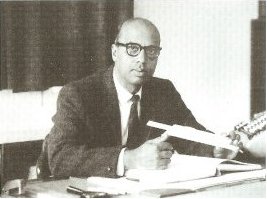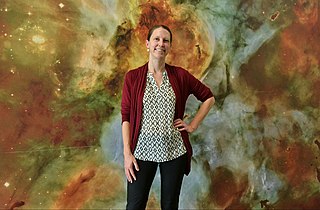Related Research Articles

Annie Jump Cannon was an American astronomer whose cataloging work was instrumental in the development of contemporary stellar classification. With Edward C. Pickering, she is credited with the creation of the Harvard Classification Scheme, which was the first serious attempt to organize and classify stars based on their temperatures and spectral types. She was nearly deaf throughout her career after 1893, as a result of scarlet fever. She was a suffragist and a member of the National Women's Party.
Lisa Jennifer Kewley is an Australian Astrophysicist and current Director of the Center for Astrophysics | Harvard & Smithsonian. Previously, Kewley was Director of the ARC Centre of Excellence for All Sky Astrophysics in 3-D and ARC Laureate Fellow at the Australian National University College of Physical and Mathematical Sciences, where she was also a Professor. Specialising in galaxy evolution, she won the Annie Jump Cannon Award in Astronomy in 2005 for her studies of oxygen in galaxies, and the Newton Lacy Pierce Prize in Astronomy in 2008. In 2014 she was elected a fellow of the Australian Academy of Science. In 2020 she received the James Craig Watson Medal. In 2021 she was elected as an international member of the National Academy of Sciences. In 2022 she became the first female director of the Center for Astrophysics | Harvard & Smithsonian.

Manali Kallat Vainu Bappu was an Indian astronomer and president of the International Astronomical Union. Bappu helped to establish several astronomical institutions in India, including the Vainu Bappu Observatory which is named after him, and he also contributed to the establishment of the modern Indian Institute of Astrophysics. In 1957, he discovered the Wilson–Bappu effect jointly with American astronomer Olin Chaddock Wilson.
Marta Burgay is an Italian radio astronomer whose initial claim to fame was being the discoverer of PSR J0737-3039, the first double pulsar, through using the 64-metre Parkes radio telescope in Australia.
Alycia J. Weinberger is a staff member at the Carnegie Institution of Washington. Before joining the Carnegie scientific staff in 2001, she was a Near Infrared Camera and Multi-Object Spectrometer (NICMOS) postdoctoral researcher and astrobiology postdoctoral fellow at University of California, Los Angeles (UCLA). She received her B.A. in Physics from the University of Pennsylvania and her PhD from Caltech. She is the 2000 winner of the Annie J. Cannon Award in Astronomy and the Vainu Bappu Gold Medal of Astronomical Society of India for 2000. In 2019 she was selected to become a fellow of the American Astronomical Society.
The Astronomical Society of India (ASI) is an Indian society of professional astronomers and other professionals from related disciplines. It was founded in 1972, with Vainu Bappu being the founder President of the Society, and as of 2010 has a membership of approximately 1000. Its registered office is at the Astronomy Department, Osmania University, Hyderabad, India. Its primary objective is the promotion of Astronomy and related branches of science. It organises meetings, supports and tries to popularise Astronomy and related subjects and publishes the Bulletin of the Astronomical Society of India.
Sarah Dodson-Robinson is an American astronomer.

Heather A. Knutson is an astrophysicist and professor at California Institute of Technology in the Division of Geological and Planetary Sciences. Her research is focused on the study of exoplanets, their composition and formation. She won the American Astronomical Society's Newton Lacy Pierce Prize in Astronomy for her work in exoplanetary atmospheres.
Sarah T. Stewart-Mukhopadhyay is an American planetary scientist known for studying planet formation, planetary geology, and materials science. She is a professor at the University of California, Davis in the Earth and Planetary Sciences Department. She was a professor at Harvard University Department of Earth and Planetary Sciences from 2003 to 2014.
Emily Levesque is an American astronomer, author, and associate professor in the Department of Astronomy at the University of Washington. She is renowned for her work on massive stars and using these stars to investigate galaxy formation. She is also the author of three books, including the 2020 popular science book The Last Stargazers: The Enduring Story of Astronomy's Vanishing Explorers.

Smadar Naoz is an Israeli-American astrophysicist, and was the 2015 winner of the Annie Jump Cannon Award in Astronomy for her scientific contributions to the fields of cosmology and planetary dynamics.

Vassiliki Kalogera is a Greek astrophysicist. She is a professor at Northwestern University and the director of the Center for Interdisciplinary Exploration and Research in Astrophysics (CIERA). She is a leading member of the LIGO Collaboration that observed gravitational waves in 2015.
Elizabeth Lada is an American astronomer whose self-described research interests include "understanding the origin, properties, evolution and fate of young embedded clusters within molecular clouds".
Rebekah Dawson is an American astrophysicist and an associate professor of astronomy and astrophysics at Pennsylvania State University. Her research focuses on simulating the evolution of exoplanetary orbits and compositions to better understand how planetary systems form.
Sarbani Basu is an Indian astrophysicist and Professor at Yale University. She is on the board of directors of the Association of Universities for Research in Astronomy and a Fellow of the American Association for the Advancement of Science.
Lauren Ilsedore Cleeves is an American astrophysicist and an assistant professor in the Department of Astronomy at the University of Virginia. She is specialized in the study of protoplanetary disks.
Blakesley Burkhart is an astrophysicist. She is the winner of the 2017 Robert J. Trumpler Award awarded by the Astronomical Society of the Pacific, which recognizes a Ph.D. thesis that is "particularly significant to astronomy." She also is the winner of the 2019 Annie Jump Cannon Award in Astronomy and the 2022 winner of The American Physical Society's Maria Goeppert-Mayer Award. The awards both cited her work on magnetohydrodynamic turbulence, and for developing innovative techniques for comparing observable astronomical phenomena with theoretical models.
Paola Caselli is an Italian astronomer and astrochemist known for her research on molecular clouds, star formation and planet formation, and the astrochemistry behind the materials found within the Solar System. She is the director of the Max Planck Institute for Extraterrestrial Physics near Munich in Germany. She also holds an honorary professorship at Ludwig Maximilian University of Munich.

Laura Kreidberg is an American astronomer who primarily studies exoplanets. Since 2020, she has been director at the Max Planck Institute for Astronomy (MPIA) in Heidelberg, where she is leading the Atmospheric Physics of Exoplanets (APEx) department. She is MPIA's managing director as of January 2024.
Catherine C. Espaillat is an American astronomer whose research is focused on the formation of planets, including the study of protoplanetary disks and young stellar objects. She is an associate professor of astronomy at Boston University, where she directs the Institute for Astrophysical Research.
References
- 1 2 Curriculum vitae (PDF), McGill University, retrieved 2024-02-18
- ↑ Annie Jump Cannon Award in Astronomy, American Astronomical Society, retrieved 2024-02-18
- ↑ Professor M. K. Vainu Bappu Gold Medal, Astronomical Society of India, retrieved 2024-02-18
- ↑ Sagynbayeva, Sabina (8 January 2024), "Meet the AAS 243 keynote speakers: Prof. Eve Lee", Astrobites, retrieved 2024-02-18